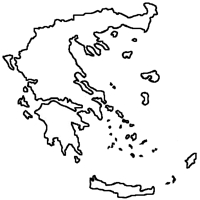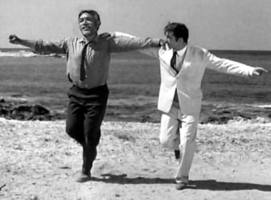
|
The Society of Folk Dance Historians (SFDH)
Why So Many Greeks Dance Today
[
Home |
About |
Encyclopedia | CLICK AN IMAGE TO ENLARGE |

|
 Sitting at one of the favorite bistros in Athens, or shall I call it "taverna," very late one night, I was suddenly enthralled by the violent ritual where customers joined in the dancing on the floor, and others were indiscriminately breaking dishes, while others poured whiskey on the floor and lighting it with a match and then breaking into a dance. The breaking of the dishes and the fire were no accident, as they appear to be vestiges of the Greek passion, the act of destroying material things in order to elevate man to a higher spiritual level, and dancing in the fire can no doubt be easily related to an ancient ritual still continuing in the northern provinces known as Anastenaria. It would be sacrilege to the sect of the Anastenaria to be considered in the same vein, but in reality, whether one is deeply connected with a very strict and disciplined tradition in order to achieve once again, a higher sense of spiritual and religious experience, which the essence is to expiate evils or wrongs.
Sitting at one of the favorite bistros in Athens, or shall I call it "taverna," very late one night, I was suddenly enthralled by the violent ritual where customers joined in the dancing on the floor, and others were indiscriminately breaking dishes, while others poured whiskey on the floor and lighting it with a match and then breaking into a dance. The breaking of the dishes and the fire were no accident, as they appear to be vestiges of the Greek passion, the act of destroying material things in order to elevate man to a higher spiritual level, and dancing in the fire can no doubt be easily related to an ancient ritual still continuing in the northern provinces known as Anastenaria. It would be sacrilege to the sect of the Anastenaria to be considered in the same vein, but in reality, whether one is deeply connected with a very strict and disciplined tradition in order to achieve once again, a higher sense of spiritual and religious experience, which the essence is to expiate evils or wrongs.
Dance, therefore, does have a specific function, and inasmuch as dance seeks to fulfill a very definite function in society, it will remain alive and have relevance among people. To define the importance in which ancient traditions still bear any relevance today, as in this case, the Greek dance, we must separate the need of sentimentally holding onto these customs and the role they play as part of the social dynamics in the community. Where do they fit the expressions or dance movements as among the elitist Eleusinian mysteries or the Panathenian Games? Where do we relate today the fierce and polemic natures as seen in some of these early forms that light the embers of emotion, stimulating the sinews into aggressive defiance and thus initiate the moment of movement and action? In analyzing the emotions, we see clearly how they transposed, changed from warlike thrusts into more delicate gestures of courtship and gentility. With these thoughts in mind, we proceed to examine the connection they have to heritage and how they reflect history.
We must have an interpretation of our own times, a sense as to where we are, the function that dance of any form has in our society, in order to look at an age-old tradition still retaining a vitality, an exuberance and a popularity among some people. We must first look at what it does and later examine what it is.
 The Greek dance is not only a flirting exuberance, nor a "thing to do," a pseudo-sophistication of Greek night clubs mushrooming in every major city all over the world, where the disfavored male is trying to flex some "machismo." The Zorba syndrome, after the novel by Nikos Kazantzakis and the movie, has unearthed the identity of many males to celebrate life and create a life-style that brought some validity to all those who have been squeezed into the time machine of the computer. Others turned to Greek dance by religiously "reconstructing" authentic steps and styling, by eulogizing in their approach some obscure characteristic dance movement discovered in some equally obscure village. These "stamp collectors" of dance movements tried hard to secure a place in the sun.
The Greek dance is not only a flirting exuberance, nor a "thing to do," a pseudo-sophistication of Greek night clubs mushrooming in every major city all over the world, where the disfavored male is trying to flex some "machismo." The Zorba syndrome, after the novel by Nikos Kazantzakis and the movie, has unearthed the identity of many males to celebrate life and create a life-style that brought some validity to all those who have been squeezed into the time machine of the computer. Others turned to Greek dance by religiously "reconstructing" authentic steps and styling, by eulogizing in their approach some obscure characteristic dance movement discovered in some equally obscure village. These "stamp collectors" of dance movements tried hard to secure a place in the sun.
What we must ask is, "What bearing does this kind of expression have for contemporary man today, be it whether he is of Greek descent or otherwise?" In a world where the antihero is more popular, how can we relate the strong movements of men that identified some kind of warlike imitations in their dance movements? What we see then instead is that Greek dance creates a sense of the "unit," a oneness or a feeling of communion with our fellow man, bringing the idea or sense of family at a time when the family idea in our society is going through a great change and alienation. This kind of provoked celebration justifies the experience felt in a dance form that is capable of reconstructing our identity.
Language, history, and folklore are interwoven in the fabric that has created these particular forms of expression in which we have found some special need to associate. The role that each culture played is also important to the development of civilization , and Greece and its culture helped shape many of these ideas by which we devoutly live. It is only fitting therefore, that we would find so much to consider in the immense values of the Greek dance in our society as a whole, with the same relevance that Greek poetry, literature, and philosophy has helped shape man and his world.
Thus the need of so many Greeks to dance, even in a taverna, is not the mer social function or the mere letting go by getting drunk and "letting it all hang out," but it is the need to partake of an immemorial tradition that has, like so many other institutions of culture, remained as a vestige of the vitality the Greeks felt and continue to feel for the celebration of life.
DOCUMENTS
- Athan Karras, an article.
- Fire Walking Rituals, an article.
- Greece, a country.
Printed in Folk Dance Scene, October 1975.
This page © 2018 by Ron Houston.
Please do not copy any part of this page without including this copyright notice.
Please do not copy small portions out of context.
Please do not copy large portions without permission from Ron Houston.